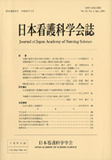Japanese
English
- 販売していません
- Abstract 文献概要
- 参考文献 Reference
- サイト内被引用 Cited by
要旨
小児病棟で長く働いた経験のある33人のナースを対象に,ターミナル期に入った小児がんの子どもの家族に対してどのような働きかけをしているのかを聞き取り,主にgrounded theoryを使って分析した.ナースたちは子どものターミナル期を通じて,家族の不安や迷いによるゆれにつきあいつつ,家族が近い将来に子どもの死が訪れるという心の準備ができるように,またよりよい選択ができるように促し続け,最期の場では必要な人物をタイミング良くそろえ,家族と子どもとの距離を近くして,穏やかな死がむかえられるという「よい看取り」の状況をつくろうとしていた.さらに,ナースたちは自分の仕事を「よい看取り」ができたかどうかによって評価し,その結果によって自分の「よい看取り」イメージを修正していた.これらを総合すると,ナースたちがターミナル期を通して受け持つ役割は「よい看取り」の演出といえる.
Abstract
Based mainly on grounded theory analysis of interviews with 33 nurses, this study describes what kind of roles experienced pediatric nurses take with families who have children in the terminal stages of cancer. During the terminal stage, the nurses not only work to take care of a family's anxieties and uncertainties, but at the same time try to lead the family toward accepting the fact that they are losing a child and encourage them to make their decisions carefully. When a child is very close to dying, the nurses try to create a “good death” situation. They do this by making sure that all the appropriate people are at the scene, that the family members are able to have physical contact with the child, and that the setting is calm. The nurses evaluate their performance in terminal care situations on the basis of how well they were able to prepare the conditions for a “good death”. They modify their concept of a “good death” based on this evaluation. In this way, they could be seen a taking the role of a stage director, molding the situation according to their concept of a “good death”.
Copyright © 2000, Japan Academy of Nursing Science. All rights reserved.


